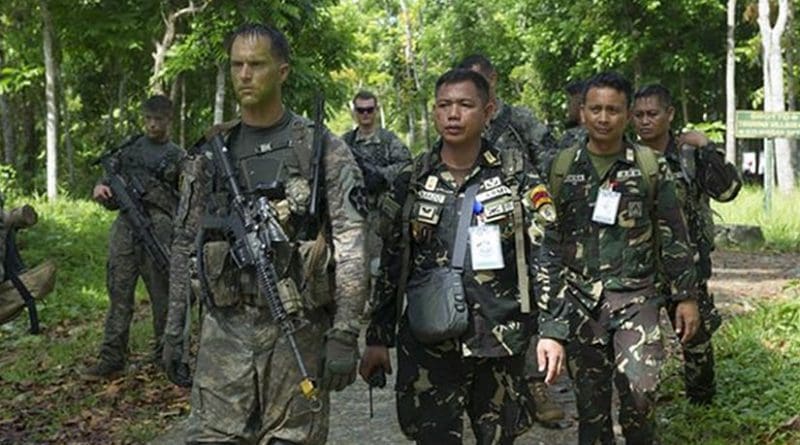After Marawi: Military’s Regional Role In Counter-Terrorism? – Analysis
By RSIS
In the wake of the Marawi conflict in 2017, counter-terrorism efforts in ASEAN are likely to involve the active participation of the armed forces of ASEAN countries and their external partners. However, this could lead to a militarised ASEAN region – an outcome that ASEAN countries should guard against even as they protect their peoples from the threat of terrorism.
By Tan See Seng*
There is growing consensus among terrorism analysts that the Battle of Marawi in Mindanao, Philippines, which lasted from May to October 2017, constitutes a watershed moment in the evolution of the terrorist threat in the ASEAN region. Reportedly, the militant groups driving that conflict, such as the Maute Group and the Abu Sayyaf, had in mind to turn Mindanao into a Wilayat (or province) of ISIS. This is not a particularly novel goal in itself since the Jemaah Islamiyah (JI) has long aspired to establish an Islamic caliphate in Southeast Asia.
What surprised analysts most about the Marawi conflict was the evident readiness of the militants to take the fight to the Philippine military by engaging in a drawn out urban war and employing tactics – including transforming densely packed buildings in the city into improvised tunnels – that initially confounded the government troops.
Marawi Game Changer
Needless to say, the emergence of ISIS in Southeast Asia – with the attacks in Jakarta in January 2016 widely seen as the first conducted in its name – is but the latest addition to a complex story of terrorism in the ASEAN region. Some analysts have cautioned against undue exaggeration of the ISIS threat because they see the greater, long-term threat arising from a rejuvenated JI, which has a larger network and is better funded than the pro-ISIS groups in the region.
Against this backdrop, what is most sobering about the Marawi episode is the prospect that it could inspire and embolden other groups, if they have the requisite men and material, to emulate or even outdo Marawi in scale, style and substance in other ASEAN cities and urban areas. Such a likelihood would also warrant the involvement of the armed forces of the ASEAN countries, whose force capabilities match or exceed that of the Marawi insurgents.
Historically, ASEAN countries have not handled terrorism in the same way. For example, Malaysia and Thailand have relied on more coercive, militaristic responses, whereas Indonesia and Singapore have mostly adopted a non-militaristic, law enforcement approach to tackling the problem.
That said, the prospect of a growing militarisation of counter-terrorism efforts cannot be ruled out: for instance, dissatisfied with the ineffective response of the Indonesian police to terrorist attacks, the Indonesian military established a new anti-terror unit known as the Joint Special Operations Command (Koopssusgab) in June 2015.
Countering Terrorism: Growing Military Role?
Much as Marawi could alter the way terrorism in Southeast Asia would henceforth be conducted, the manner in which ASEAN countries respond to the terrorist threat could also change in a number of ways.
Firstly, ASEAN countries and their defence establishments are likely to deepen their collaboration in counter-terrorism not only among themselves but with their external partners. They will do so through conducting joint exercises, sharing information and enhancing their force capabilities within existing frameworks such as the ASEAN Defence Ministers’ Meeting-Plus (or ADMM+). In this respect, joint counter-terrorism exercises such as the one that took place in Singapore in May 2016 involving 40 special forces teams from all 18 ADMM+ countries could well increase.
Secondly, the Marawi conflict memorably led to separate offers of military assistance from Indonesia, Malaysia and Singapore to their imperilled ASEAN neighbour. This implies that ASEAN countries are likely to seek new ways to collaborate against terrorism.
But it should be said that Indonesia, Malaysia and Singapore – the so-called “core countries” of ASEAN – have had a long history of security cooperation among themselves, including the Malacca Strait Sea Patrols and the “Eyes in the Sky” initiative.
More recently, Indonesia and Malaysia established the Trilateral Maritime Patrol with the Philippines in June 2017 to guard the Sulu-Sulawesi seas, long a hub for transnational organised crime and militancy. Going forward, the ASEAN defence establishments are likely to leverage on these existing forms of cooperation in their quest for new and innovative approaches in response to the growing scale and complexity of the terrorist threat in their region.
ASEAN’s Challenge: Balancing Security and Liberty?
Needless to say, the prospect of a growing regional role for ASEAN’s militaries raises questions over how national governments are to avoid overstepping regional sensibilities and civil liberties even as they work to protect their citizens from terrorism and violence. The likelihood of militarisation is especially poignant for countries with a complicated military past, such as Indonesia.
For instance, the Indonesian military’s establishment of its counter-terror unit Koopssusgab immediately reignited fears, unjustified or otherwise, over potential interference by the military once again in the country’s civilian affairs.
On the other hand, the possibility that ASEAN countries may soon find soldiers from other nations, including external powers, operating on their home soil cannot be ruled out.
How affected countries and societies in need of external assistance are able to host foreign troops and facilitate counterinsurgency operations without jeopardising their sovereignty is likely to emerge as a key concern as ASEAN countries and militaries cooperate to tackle the common challenge of terrorism in their neck of the woods.
*Tan See Seng is Professor of International Relations at the S. Rajaratnam School of International Studies (RSIS), Nanyang Technological University, Singapore. He is also Deputy Director and Head of Research of the Institute of Defence and Strategic Studies (IDSS), at RSIS and currently a visiting scholar at the EU Centre in Singapore.

